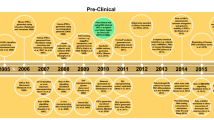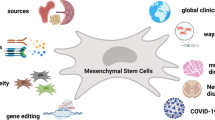Abstract
Background
Mesenchymal stromal cells (MSC) are multipotent progenitor cells found in the tumor microenvironment. They have an innate and regulatory immune activity, and they are able to produce immunosuppressive adenosine (ADO) via their ectonucleotidases CD39 and CD73. The present study explores ADO metabolism of MSC in relation to their developmental status.
Methods
We analyzed MSC (n = 6), chondrogenic progenitor cells (CPC, n = 8), and chondrocytes (n = 8) for surface markers by flow cytometry. The ability to hydrolyze ATP and to produce ADO was tested by luminescence assays and mass spectrometry.
Results
Significant differences in the surface marker expression of MSC, CPC, and chondrocytes were seen. While the expression of CD73 was observed to be the same on all cell types, the expression of the ectonucleotidase CD39 was significantly increased on MSC. Consequently, production of ADO was most abundant in MSC as compared with chondrocytes and CPC.
Conclusion
Mesenchymal stromal cells are potent producers of ADO and are, therefore, able to increase immunosuppression. As MSC differentiate into chondrocytes, they lose this ability and may take on other functions.
Zusammenfassung
Hintergrund
Mesenchymale Stromazellen (MSC) sind multipotente Vorläuferzellen, welche im Tumormikromilieu vorkommen. Sie besitzen eine angeborene und regulatorische Immunaktivität und können durch ihre Ektonukleotidasen CD39 und CD73 immunsuppressives Adenosin (ADO) produzieren. In der vorliegenden Studie wurde der ADO-Metabolismus von MSC in Bezug auf den Entwicklungsstatus der MSC untersucht.
Methoden
Dazu erfolgte eine durchflusszytometrische Untersuchung von MSC (n = 6), chondrogenen Vorläuferzellen (CPC, n = 8) und Chondrozyten (n = 8) in Bezug auf Oberflächenmarker. Die Fähigkeit, ATP zu hydrolysieren und ADO zu produzieren, wurde durch Lumineszenz-Assays und Massenspektrometrie getestet.
Ergebnisse
Signifikante Unterschiede in der Expression von Oberflächenmarkern wurden bei MSC, CPC und Chondrozyten festgestellt. Während die Expression von CD73 bei allen Zelltypen gleich war, erwies sich die Expression der Ektonukleotidase CD39 bei MSC als signifikant erhöht. Folglich war die Produktion von ADO bei MSC im Vergleich zu Chondrozyten und CPC am höchsten.
Schlussfolgerung
Mesenchymale Stromazellen sind potente Produzenten von ADO und können daher die Immunsuppression steigern. Wenn sich MSC in Chondrozyten differenzieren, verlieren sie diese Fähigkeit und können andere Funktionen übernehmen.




Similar content being viewed by others
References
Abumaree M, Al Jumah M, Pace RA et al (2012) Immunosuppressive properties of mesenchymal stem cells. Stem Cell Rev 8:375–392
Allard B, Longhi MS, Robson SC et al (2017) The ectonucleotidases CD39 and CD73: novel checkpoint inhibitor targets. Immunol Rev 276:121–144
Antonioli L, Pacher P, Vizi ES et al (2013) CD39 and CD73 in immunity and inflammation. Trends Mol Med 19:355–367
Avila-Ibarra LR, Mora-Garcia ML, Garcia-Rocha R et al (2019) Mesenchymal stromal cells derived from normal cervix and cervical cancer tumors increase CD73 expression in cervical cancer cells through TGF-beta1 production. Stem Cells and Development 28:477–488
Bao R, Shui X, Hou J et al (2016) Adenosine and the adenosine A2A receptor agonist, CGS21680, upregulate CD39 and CD73 expression through E2F‑1 and CREB in regulatory T cells isolated from septic mice. Int J Mol Med 38:969–975
Bastid J, Regairaz A, Bonnefoy N et al (2015) Inhibition of CD39 enzymatic function at the surface of tumor cells alleviates their immunosuppressive activity. Cancer Immunol Res 3:254–265
Brandau S, Jakob M, Hemeda H et al (2010) Tissue-resident mesenchymal stem cells attract peripheral blood neutrophils and enhance their inflammatory activity in response to microbial challenge. J Leukoc Biol 88:1005–1015
Ciciarello M, Zini R, Rossi L et al (2013) Extracellular purines promote the differentiation of human bone marrow-derived mesenchymal stem cells to the osteogenic and adipogenic lineages. Stem Cells and Development 22:1097–1111
Deaglio S, Dwyer KM, Gao W et al (2007) Adenosine generation catalyzed by CD39 and CD73 expressed on regulatory T cells mediates immune suppression. J Exp Med 204:1257–1265
Diaz-Romero J, Gaillard JP, Grogan SP et al (2005) Immunophenotypic analysis of human articular chondrocytes: changes in surface markers associated with cell expansion in monolayer culture. J Cell Physiol 202:731–742
Dokic J, Tomic S, Markovic M et al (2013) Mesenchymal stem cells from periapical lesions modulate differentiation and functional properties of monocyte-derived dendritic cells. Eur J Immunol 43:1862–1872
Elsaesser AF, Schwarz S, Joos H et al (2016) Characterization of a migrative subpopulation of adult human nasoseptal chondrocytes with progenitor cell features and their potential for in vivo cartilage regeneration strategies. Cell Biosci 6:11
Engela AU, Baan CC, Peeters AM et al (2013) Interaction between adipose tissue-derived mesenchymal stem cells and regulatory T‑cells. Cell Transplant 22:41–54
Figueiro F, Muller L, Funk S et al (2016) Phenotypic and functional characteristics of CD39high human regulatory B cells (Breg). OncoImmunology 5:e1082703
Gharibi B, Abraham AA, Ham J et al (2011) Adenosine receptor subtype expression and activation influence the differentiation of mesenchymal stem cells to osteoblasts and adipocytes. J Bone Miner Res 26:2112–2124
Gullo F, De Bari C (2013) Prospective purification of a subpopulation of human synovial mesenchymal stem cells with enhanced chondro-osteogenic potency. Rheumatology 52:1758–1768
Hemeda H, Jakob M, Ludwig AK et al (2010) Interferon-gamma and tumor necrosis factor-alpha differentially affect cytokine expression and migration properties of mesenchymal stem cells. Stem Cells and Development 19:693–706
Ivanova-Todorova E, Bochev I, Dimitrov R et al (2012) Conditioned medium from adipose tissue-derived mesenchymal stem cells induces CD4+FOXP3+ cells and increases IL-10 secretion. J Biomed Biotechnol 2012:295167
Kansy BA, Dissmann PA, Hemeda H et al (2014) The bidirectional tumor—mesenchymal stromal cell interaction promotes the progression of head and neck cancer. Stem Cell Res Ther 5:95
Kobolak J, Dinnyes A, Memic A et al (2016) Mesenchymal stem cells: Identification, phenotypic characterization, biological properties and potential for regenerative medicine through biomaterial micro-engineering of their niche. Methods 99:62–68
Li YY, Choy TH, Ho FC et al (2015) Scaffold composition affects cytoskeleton organization, cell-matrix interaction and the cellular fate of human mesenchymal stem cells upon chondrogenic differentiation. Biomaterials 52:208–220
Lim YS, Lee JC, Lee YS et al (2012) Growth inhibitory effect of palatine tonsil-derived mesenchymal stem cells on head and neck squamous cell carcinoma cells. Clin Exp Otorhinolaryngol 5:86–93
Linnemann C, Schildberg FA, Schurich A et al (2009) Adenosine regulates CD8 T‑cell priming by inhibition of membrane-proximal T‑cell receptor signalling. Immunology 128:e728–737
Minguet S, Huber M, Rosenkranz L et al (2005) Adenosine and cAMP are potent inhibitors of the NF-kappa B pathway downstream of immunoreceptors. Eur J Immunol 35:31–41
Morandi F, Morandi B, Horenstein AL et al (2015) A non-canonical adenosinergic pathway led by CD38 in human melanoma cells induces suppression of T cell proliferation. Oncotarget 6:25602–25618
Netsch P, Elvers-Hornung S, Uhlig S et al (2018) Human mesenchymal stromal cells inhibit platelet activation and aggregation involving CD73-converted adenosine. Stem Cell Res Ther 9:184
Ode A, Schoon J, Kurtz A et al (2013) CD73/5′-ecto-nucleotidase acts as a regulatory factor in osteo-/chondrogenic differentiation of mechanically stimulated mesenchymal stromal cells. Eur Cell Mater 25:37–47
Riegger J, Palm HG, Brenner RE (2018) The functional role of chondrogenic stem/progenitor cells: novel evidence for immunomodulatory properties and regenerative potential after cartilage injury. Eur Cell Mater 36:110–127
Sattler C, Steinsdoerfer M, Offers M et al (2011) Inhibition of T‑cell proliferation by murine multipotent mesenchymal stromal cells is mediated by CD39 expression and adenosine generation. Cell Transplant 20:1221–1230
Saze Z, Schuler PJ, Hong CS et al (2013) Adenosine production by human B cells and B cell-mediated suppression of activated T cells. Blood 122:9–18
Schuler PJ, Saze Z, Hong CS et al (2014) Human CD4+ CD39+ regulatory T cells produce adenosine upon co-expression of surface CD73 or contact with CD73+ exosomes or CD73+ cells. Clin Exp Immunol 177:531–543
Schuler PJ, Westerkamp AM, Kansy BA et al (2017) Adenosine metabolism of human mesenchymal stromal cells isolated from patients with head and neck squamous cell carcinoma. Immunobiology 222:66–74
Sundstrom P, Stenstad H, Langenes V et al (2016) Regulatory T cells from colon cancer patients inhibit effector T‑cell migration through an adenosine-dependent mechanism. Cancer Immunol Res 4:183–193
Tan L, Zhao B, Ge FT et al (2017) Shockwaves inhibit chondrogenic differentiation of human mesenchymal stem cells in association with adenosine and A2B receptors. Sci Rep 7:14377
Ziebart A, Huber U, Jeske S et al (2018) The influence of chemotherapy on adenosine-producing B cells in patients with head and neck squamous cell carcinoma. Oncotarget 9:5834–5847
Acknowledgements
We thank Katja Hasch, Gabriela Cudek, and Monika Jerg for their support in performing the experiments.
Funding
The research was supported by the German Research Foundation (DFG) Grant # SCHU 2536/3 (PJS), by NIH grants (EKJ) DK068575, DK079307, DK091190, HL109002, and by the International Graduate School in Molecular Medicine Ulm (SSJ).
Author information
Authors and Affiliations
Corresponding author
Ethics declarations
Conflict of interest
S. S. Jeske, M. N. Theodoraki, E. Boelke, S. Laban, C. Brunner, N. Rotter, E. K. Jackson, T. K. Hoffmann, and P. J. Schuler declare that they have no competing interests.
All procedures performed in studies involving human participants or on human tissue were in accordance with the ethical standards of the institutional and/or national research committee and with the 1975 Helsinki declaration and its later amendments or comparable ethical standards. Cartilage harvesting was approved by the local ethics committee (#152/08). Informed consent was obtained from all individual participants included in the study.
Rights and permissions
About this article
Cite this article
Jeske, S.S., Theodoraki, M.N., Boelke, E. et al. Adenosine production in mesenchymal stromal cells in relation to their developmental status. HNO 68, 87–93 (2020). https://doi.org/10.1007/s00106-019-00805-z
Published:
Issue Date:
DOI: https://doi.org/10.1007/s00106-019-00805-z




